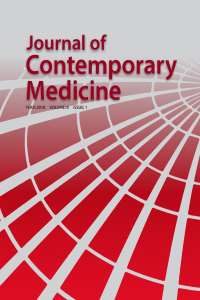Acil serviste yapılan bilgisayarlı tomografi görüntüleme istemleri ne kadar etkin?
Bilgisayarlı tomografi, etkinlik maliyet, acil servis
How effective are the computerized tomography imaging prompts in the emergency department?”
Computed tomography, efficacy cost, emergency department,
___
- 1. Hendee WR, Becker GJ, Borgstede JP, Bosma J, Casarella WJ, Erickson BA, et al. Addressing overutilization in medical imaging. Radiology. 2010;257(1):240-5.
- 2. Carnevale TJ, Meng D, Wang JJ, Littlewood M. Impact of an emergency medicine decision support and risk education system on computed tomography and magnetic resonance imaging use. J Emerg Med. 2015;48(1):53-7. 4.
- 3. Griffey RT, Jeffe DB, Bailey T. Emergency physicians' attitudes and preferences regarding computed tomography, radiation exposure, and imaging decision support. Acad Emerg Med. 2014;21(7):768-77.
- 4. Erkoç MF, İmamoğlu H, Dostbil AB, Okur. A Is cranial CT really required in the emergency department for each patient with headache? Ortadoğu Tıp Dergisi.2012,4(3):114-116
- 5. Freid VM, Bernstein AB. Health care utilization among adults aged 55-64 years: how has it changed over the past 10 years? NCHS data brief. 2010(32):1-8.
- 6. Dağlar B, Delİalİoğlu ÖM, Ceyhan E ve ark. Acil ortopedi ve travmatoloji polikliniğinde omurga ve pelvis değerlendirmesi için gereksiz bilgisayarlı tomografi kullanımı Acta Orthop Traumatol Turc 2008;42(1):59-63
- 7. Köse A, Köse B, Öncü MR, Tuğrul F. Bir devlet hastanesi acil servisine başvuran hastaların profili ve başvurunun uygunluğu Gaziantep Tıp Derg 2011;17(2): 57-62
- 8. Aydın T, Akköse Aydın Ş, Köksal Ö, Özdemir F, Kulaç S, Bulut M. Uludağ Üniversitesi Tıp Fakültesi Hastanesi Acil Servisine Başvuran Hastaların Özelliklerinin ve Acil Servis Çalışmalarının Değerlendirilmesi JAEM 2010: 163-8.
- 9. Jennett B,Epidemiology of head injury. J Neurol Neurosurg Psychiatry. 1996 Apr; 60(4): 362–369
- 10. Cifu DX, Kreutzer JS, Kolakowsky-Hayner SA, et al. The relationship between therapy intensity and rehabilitative outcomes after traumatic brain injury: a multicenter analysis. Arch phys Med Rehabil. 2003; 84: 1441-1448 . 11. Eker C, Schalen W, Asgeirsson B, Grande PO, et al. Reduced mortality after severe head injury will increase the demands for rehabilitation services. Brain Injury 2000; 14: 605-619.
- 12. Hukkelhoven CW, Steyerberg EW, Rampen AJJ, et al Patient age and outcome following severe traumatic brain injury: an analysis of 5600 patients. J Neurosurg 2003; 99:666-673.
- 13. Stiell IG, Wells GA, Vandemheen K, Laupacis A, Brison R, Eisenhover MA, Variation in ED use of computed tomography for patients with minor head injury.Ann Emerg Med 1997; 30: 14-22
- 14. Thomson R, Gray J, Madhok R, Mordue A, Mendelow AD.Effect of guidelines on management of head injury on record keeping and decision making in accident and emergency departments.Qual Health Care. 1994 Jun;3(2):86-91.
- 15. Ingebrigsten T, Romner B. Routine early CT-scan is cost saving after minor head injury. Acta Neurol Scand 1996; 93: 207-210
- 16. Ibanez J, Arıkan F, Pedraza S, Sanchez E, Poca MA, Rodriguez D. Reliability of clinical guidelines in the detection of patients at risk following mild head injury:results of aprospective study. J Neurosurg 2004; 100: 825-83
- 17. Haydel M.J, Preston C.A, Mills TJ, Luber S, Blaudeau BAE, Deblieux P.M.C.Indications For Computed Tomography in Patients With Minor Head İnjury. N Engl J Med, 2000;343:100-105
- 18. Masson F, Thicoipe M, Mokni T, et al. Epidemiology of traumatic comas: a prospective population-based study. Brain Injury. 2003; 17: 279-293.
- 19. Hodgson L: Cost Containment in the Emergency Department. CAL/ACEP 1993 Source Guide, 1993:710
- 20. Ergene Ü, Ergene O, Fowler J. Acil Tıptaki Tanı Testlerinde Bedel-Etkinlik, Süleyman Demirel Üniversitesi Yayınları, Yayın No:3, Mayıs 1999, İzmir.
- Yayın Aralığı: Yılda 6 Sayı
- Başlangıç: 2011
- Yayıncı: Rabia YILMAZ
Böbrek ve Üriner Sistemin Doğumsal Anomalileri: 806 Olgunun Analizi
Ahmet Midhat ELMACI, Muhammet İrfan DÖNMEZ
Absans Epilepsi Modeli Olan Waj/Rij Sıçanlarda Duloksetinin ECoG Aktivitesi Üzerine Etkisi
Mehmet KABALCI, Nesimi GÜNAL, Ali BOLAT, Koray DURAL, Berkant ÖZPOLAT
Cennet RAGBETLİ, Hüseyin GÜDÜCÜOĞLU, Mehmet PARLAK
Autism and Vaccinations: Does Google side with Science?
Semih ERDEN, Kevser NALBANT, Hurşit FERAHKAYA
Murat KONAK, Ömer ERDUR, Muhammed Yaşar KILINÇ, Hanifi SOYLU
Tıkayıcı Uyku Apne Sendromlu Olgularda Uyku MRG Ve Uyku Endoskopisi Bulgularının Karşılaştırılması
Volkan ÇAĞLAYAN, Müge ÖZÇELİK KORKMAZ, Şenol CİVELEK
Sevgi KESICI, Mehmet DEMIRCI, Ugur KESICI
Adnan BARUTÇU, Sevcan ERDEM, Fadli DEMİR, Saliha BARUTÇU, Göksel LEBLEBİSATAN
